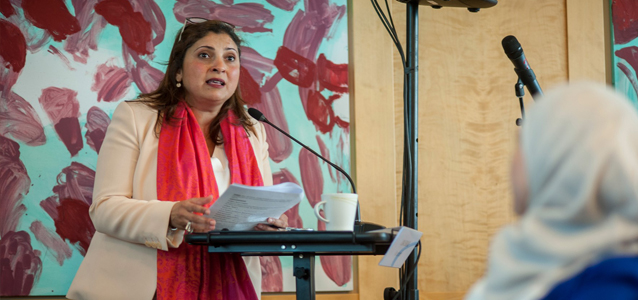Take five: “Women pay the highest price in the Syrian conflict”
Date:

Lina Sinjab is a Syrian journalist who has covered the conflict in Syria for BBC and other media outlets since 2011. She served as the moderator of a dialogue between Syrian women and policy-makers, held on the sidelines of the EU-UN conference “Supporting the Future of Syria and the Region” organized in Brussels last month. Ms. Sinjab spoke to UN Women about her views on the role of Syrian women in the conflict and the construction of peace.
As a woman and as a journalist covering the conflict in Syria, what do you think are the main issues facing Syrian women?
Women pay the highest price in the Syrian conflict. With so many men being killed, imprisoned or disappearing, women remain as the breadwinners for their families. They must toughen up their lives and respond to the needs created by this war.
What should be the role of Syrian women in the construction of peace?
We cannot build peace and the future of Syria if it is designed and conceived by men only. We know that those who are trying to make peace are the ones who made the war. We need women participating. We need their voices. It is not possible to even imagine a better future with only half of the society. We need our women to be more empowered, to participate more actively and to be heard more loudly.
What can be done to empower Syrian women, both in Syria and in host countries?
Peace first. With safety and stability, Syrian women will be able to be empowered. Access to education and work without the fear of harassment or intimidation based on their gender. Whether they are inside, or in other countries, especially in refugee camps.
How can the international community support Syrian women?
By keep working with them. By insisting that women be included in every committee, every organization and not only the empowered women who already have a voice. The international community needs to reach out to the women sitting at the refugee camps, on a tent, scared for their lives, and the lives of their children. They also have a voice, they need to be represented. The international community also has to work with the host countries where these refugees are to ensure that Syrian women are not discriminated against and they are included in every process for the future of Syria.
What do you think should be the actions that should be prioritized by policymakers?
Politicians, peacemakers and stakeholders on both sides of the conflict, who are deciding Syria’s future and peace process, should make sure that women are sitting on the negotiation table and have a say, not just ticking the box of having women representatives, but really listening to their views and their concerns.